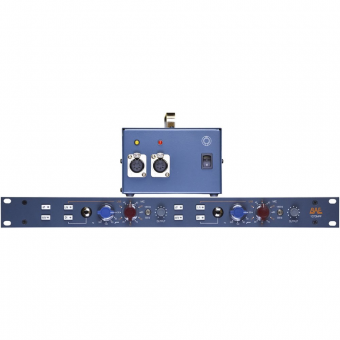BAE 1073MPF Dual-Channel Mic Pre - with PSU

 10 540 BYN предложить свою цену
27897
10 540 BYN предложить свою цену
27897
The BAE 1073MPF is basically a deluxe 1073MP with one added feature, a high pass filter. BAE integrated the same inductor based high pass filter that's in the 1073 and added it to the 1073MPF.
- Phase reverse button
- Impedance select between 1200 and 300 ohms
- Direct input switch
- Balanced line input
- 48v phantom power
- Same 283 amp card as 1073
- Same transformers as the 1073
- Same hand-wired modular construction that BAE is known for
Features:
- Two Class A preamps with direct inputs in a single rack space with an external power supply
- High Impedance direct input for guitar and synthesizer
- Output level control serves as gain trim between the 5 dB steps on gain switch
- Balanced mic input and balanced +4 dB output are on XLR connectors off the rear of the module.
- Balanced line input is achieved through the LN switch on the front.
- Phase reverse
- Mic input impedance toggle switch between 1200 ohm and 300 ohm
- Similar Class A preamp as Neve™* 1073 equalizer/preamp modules
- Pad is an integral part of the gain switch same as Neve™* 1073 equalizer/preamp modules
- Has integrated phantom power with a lighted switch on the front panel
- Oversize remote power supply can operate up to four channels of preamp
The 1073MPF preamp yields a really fat sound. It seems to add subharmonics to the low end which makes the bottom end sound huge. It smoothes the top end, giving the highs a silky sheen. The BAE 1073 slightly compresses transients, as well. It is a smooth, fat, larger than life sound. An added bonus is to use the front-panel DI inputs to fatten samples and synths and instruments. Balanced line-level inputs on the rear allow for fattening and punching up entire mixes, or in a signal chain with other +4 gear.
Set the gain knob (red Marconi) around 20 on the dial and set the output (grey knob) fully clockwise. This gives you the highest headroom and cleanest signal path. Every click is in 5db increments so if one click is too hot, attenuate the output to get in between the 5db steps.
Another trick people like to do is to put the final mix through the balanced line inputs on the back to get that harmonic distortion. To get even more of that Class A output stage is to come out of channel 1 and into channel 2 then you have an accumulative effect of that classic output stage.
* Neve is a trademark or registered trademark of AMS-Neve LTD and BAE is not affiliated with such entity.
